初中一般过去时讲解及练习答案解析
英语一般过去时专题训练答案及解析

英语一般过去时专题训练答案及解析一、初中英语一般过去时1.He almost fell down. But he _____.A. didn'tB. doesn'tC. won't【答案】 A【解析】【分析】句意:他几乎摔倒,但是他没有。
前句动词fell是fall的过去式,说明句子用的一般过去时态,后句也还是对那件事的描述,还是用一般过去时态,否定:动词前面加didn't,同时把动词变为原形。
故选A。
2.Everyone except Tom and John there when the meeting began.A. areB. isC. wereD. was【答案】 D【解析】【分析】句意:当会议开始的时候,除了Tom和John没来,每个人都在这。
except和besides两者都是“除去”之意,但前者指“但并不包括”,是“排除”之意,后者指“除此之外还有”,是“外加”之意。
举例如下:There are six of us besides Tom.除汤姆外,另外还有6人。
(一共7人)We all went home except Tom.除汤姆外,我们全回家了。
(只有汤姆一人未回家)。
谓语动词要看except前面的主语。
故选D。
【点评】本题考查be动词。
以及are、is、were、was四个词的用法和区别。
3.-Have you ever been to Xiamen?-Yes. I _ there in 2013.A. goB. wentC. have gone【答案】 B【解析】【分析】句意:一你去过厦门吗?一是的,我2013年去的。
当句子里有表示过去的时间状语时,句子通常就是强调在这个过去时间里发生的动作,句子要用一般过去时态。
本句强调在2013年去那儿,用一般过去时,故选B。
4.—Do you know who invented lights?—Yes, they by Edison.A. inventedB. are inventedC. were inventedD. was invented【答案】 C【解析】【分析】句意:——你知道谁发明了电灯吗?——是的,它们是被爱迪生发明的。
人教版八年级上册一般过去时语法讲解及练习(含答案)

一般过去时语法讲练一、含义一般过去时表示过去某个时间里发生的动作或状态;过去习惯性、经常性的动作、行为。
二、用法(一)表示过去某个时间或某一段时间发生的动作或存在的状态①平时经常的或习惯性的动作,通常用一个实义动词来描述。
She came back home after dinner yesterday.I had a word with Julia this morningHe was in Shanghai last year.They were young four years ago.(二)表示过去经常或反复发生的动作He got up at 7 every day.Mrs. Peter always carried an umbrella.常用used to/would表示过去习惯性动作:He used to visit his mother once a week.The old man would sit on a bench in the quiet park and look at others for hours without doing anything or talking to anybody.(三)有时可替代一般现在时,表达一种婉转、客气、礼貌、商量的语气Would you mind my siting here?(四)时间标志词yesterday, the day before yesterday, last week/year/summer , two/three/days/weeks ago, that morning/winter/day/year, those days/years, at that time/moment, in 1990, just now, in the old days, two hours later, one day, when I was …years old/when I was young…三、句型结构(一)be动词四、动词过去式(过去式)的变化规则(一)直接加edlisten-listened visit-visited walk-walked(二)以e结尾,直接加dlive-lived hope-hoped(三)以辅音字母加y结尾的动词,变y为i加edcarry-carried study-studied(四)以重读闭音节结尾,如末尾只有一个辅音字母,双写辅音字母加edshop-shopped stop-stopped drop-dropped plan-planned fit-fitted prefer-preferredI lived ( live )in Shanghai in 2003.(五)不规则动词过去式的变化需特殊记忆buy-bought go-went read-readI read (read) English yesterday morning.【注意事项】1、一般过去时只说明过去的事情,不强调动作对现在的影响。
英语一般过去时试题(有答案和解析)及解析
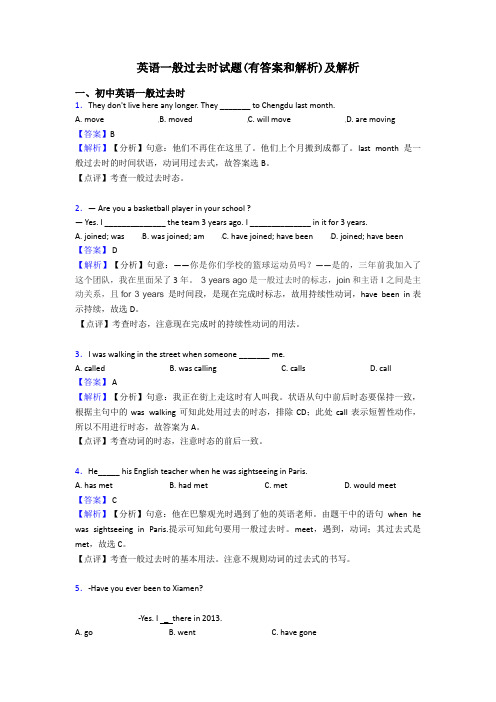
英语一般过去时试题(有答案和解析)及解析一、初中英语一般过去时1.They don't live here any longer. They _______ to Chengdu last month.A. moveB. movedC. will moveD. are moving【答案】B【解析】【分析】句意:他们不再住在这里了。
他们上个月搬到成都了。
last month是一般过去时的时间状语,动词用过去式,故答案选B。
【点评】考查一般过去时态。
2.— Are you a basketball player in your school ?— Yes. I ______________ the team 3 years ago. I ______________ in it for 3 years.A. joined; wasB. was joined; amC. have joined; have beenD. joined; have been【答案】 D【解析】【分析】句意:——你是你们学校的篮球运动员吗?——是的,三年前我加入了这个团队,我在里面呆了3年。
3 years ago是一般过去时的标志,join和主语 I 之间是主动关系,且for 3 years是时间段,是现在完成时标志,故用持续性动词,have been in表示持续,故选D。
【点评】考查时态,注意现在完成时的持续性动词的用法。
3.I was walking in the street when someone _______ me.A. calledB. was callingC. callsD. call【答案】 A【解析】【分析】句意:我正在街上走这时有人叫我。
状语从句中前后时态要保持一致,根据主句中的was walking可知此处用过去的时态,排除CD;此处call表示短暂性动作,所以不用进行时态,故答案为A。
超详细一般过去时的全面讲解【附练习与答案】
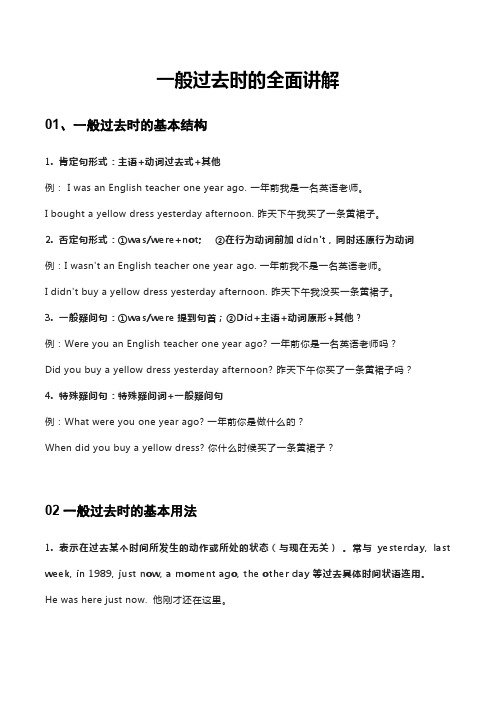
一般过去时的全面讲解01、一般过去时的基本结构1. 肯定句形式:主语+动词过去式+其他例: I was an English teacher one year ago. 一年前我是一名英语老师。
I bought a yellow dress yesterday afternoon. 昨天下午我买了一条黄裙子。
2. 否定句形式:①was/were+not; ②在行为动词前加didn't,同时还原行为动词例:I wasn't an English teacher one year ago. 一年前我不是一名英语老师。
I didn't buy a yellow dress yesterday afternoon. 昨天下午我没买一条黄裙子。
3. 一般疑问句:①was/were提到句首;②Did+主语+动词原形+其他?例:Were you an English teacher one year ago? 一年前你是一名英语老师吗?Did you buy a yellow dress yesterday afternoon? 昨天下午你买了一条黄裙子吗?4. 特殊疑问句:特殊疑问词+一般疑问句例:What were you one year ago? 一年前你是做什么的?When did you buy a yellow dress? 你什么时候买了一条黄裙子?02一般过去时的基本用法1. 表示在过去某个时间所发生的动作或所处的状态(与现在无关)。
常与yesterday, last week, in 1989, just now, a moment ago, the other day等过去具体时间状语连用。
He was here just now. 他刚才还在这里。
What did you do yesterday? 你昨天做了什么事?2. 在过去一段时间内的经常性或习惯性动作。
一般过去时练习和答案解析

般过去时一般过去时( simple past tense) 表示过去某个时间里发生的动作或状态;过去习惯性、经常性的动作、行为;过去主语所具备的能力和性格。
一、一般过去时的形式1 .动词be的一般过去时态的形式有两种,即was, were 。
was用于第一、三人称单数,were 用于第一、三人称复数和第二人称单、复数。
You were we were they were2. 行为动词一般过去时态的形式:动词的过去式,没有人称和数的变化。
二、一般过去时的用法1. 表示过去某个特定时间发生的动作或存在的状态这种情况常下与“just now 刚才,yesterday 昨天,last year 去年,in 1999 在1999 年,two days ago 两天之前”等表示过去的时间状语连用。
She suddenly fell ill yesterday.她昨天突然病倒了。
We didn't have classes last week.上周我们没有上课一般过去时亦可与“ today今天,this week 这周,this mon th 这个月,this year 今年”等表示现阶段时间状语连用。
如:Did you meet him today今天你看见他了吗2. 表示过去的习惯性或经常发生的动作一般过去时表示过去经常或反复发生的动作,常和“often 经常,always 总是,once a week 一周一次”等表示频度的时间状语连用。
I went to the cinema once a week when I was at school.我上学时每周去看一场电影。
When I was in the , I often walked by the .我在乡下时经常在河边散步。
表示过去一段时间内经常或反复发生的动作,也可以用would+ 动词原形或用used to 加动词原形:When he was young, he would go every winter.他年轻时每年冬天都要去滑冰。
(英语)英语一般过去时及其解题技巧及练习题(含答案)及解析

(英语)英语一般过去时及其解题技巧及练习题(含答案)及解析一、初中英语一般过去时1.As we all know, the Silk Road _______ China to the west in ancient times.A. connectsB. connectedC. will connectD. is connecting【答案】B【解析】【分析】句意:众所周知,在古代丝绸之路是连接中国和西方的。
In ancient times“在古代”,因此要用一般过去式。
结合句意,故选B。
【点评】考查动词时态。
2.Everyone except Tom and John there when the meeting began.A. areB. isC. wereD. was【答案】 D【解析】【分析】句意:当会议开始的时候,除了Tom和John没来,每个人都在这。
except和besides两者都是“除去”之意,但前者指“但并不包括”,是“排除”之意,后者指“除此之外还有”,是“外加”之意。
举例如下:There are six of us besides Tom.除汤姆外,另外还有6人。
(一共7人)We all went home except Tom.除汤姆外,我们全回家了。
(只有汤姆一人未回家)。
谓语动词要看except前面的主语。
故选D。
【点评】本题考查be动词。
以及are、is、were、was四个词的用法和区别。
3.—Have you ever been to South Tower Park?—Yes. I ___________there a few months ago.A. wentB. have beenC. have gone【答案】A【解析】【分析】句意:—你曾经去过南塔公园吗?—是的,几个月前我去那儿了。
have been to曾经去过某地;have gone to去某地了;根据a few months ago.可知用一般过去时,动词用过去式,故选A。
一般过去时讲解及练习含答案
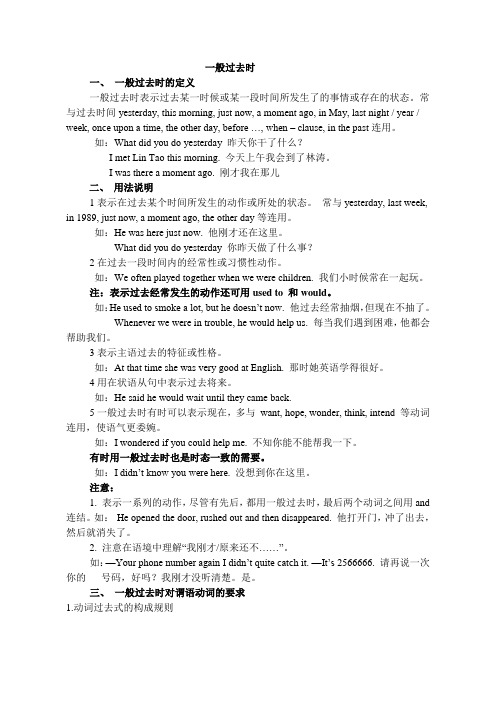
一般过去时一、一般过去时的定义一般过去时表示过去某一时候或某一段时间所发生了的事情或存在的状态。
常与过去时间yesterday, this morning, just now, a moment ago, in May, last night / year / week, once upon a time, the other day, before …, when – clause, in the past连用。
如:What did you do yesterday 昨天你干了什么?I met Lin Tao this morning. 今天上午我会到了林涛。
I was there a moment ago. 刚才我在那儿二、用法说明1表示在过去某个时间所发生的动作或所处的状态。
常与yesterday, last week, in 1989, just now, a moment ago, the other day等连用。
如:He was here just now. 他刚才还在这里。
What did you do yesterday 你昨天做了什么事?2在过去一段时间内的经常性或习惯性动作。
如:We often played together when we were children. 我们小时候常在一起玩。
注:表示过去经常发生的动作还可用used to 和would。
如:He used to smoke a lot, but he doesn’t now. 他过去经常抽烟,但现在不抽了。
Whenever we were in trouble, he would help us. 每当我们遇到困难,他都会帮助我们。
3表示主语过去的特征或性格。
如:At that time she was very good at English. 那时她英语学得很好。
4用在状语从句中表示过去将来。
如:He said he would wait until they came back.5一般过去时有时可以表示现在,多与want, hope, wonder, think, intend 等动词连用,使语气更委婉。
英语一般过去时试题(有答案和解析)及解析

英语一般过去时试题(有答案和解析)及解析一、初中英语一般过去时1.Mr Zhang and his wife _______to the party last Sunday。
()A. invitedB. was invitedC. were invited【答案】 C【解析】【分析】句意:上周星期天请的张先生和妻子参加晚会。
表示上周星期天发生的过去动作,用一般过去时态;主语Mr Zhang and his wife是谓语动词invite的承受者,用被动语态,主语Mr Zhang and his wife表示复数合义。
故选C。
2.—Linda hasn't come to the party yet.—But she . I think I have to call her again.A. promisesB. promisedC. will promise【答案】 B【解析】【分析】句意:——琳达还没来参加聚会。
——但她答应了。
我想我得再给她打个电话。
根据 I think I have to call her again. 我得再给她打个电话。
可知她答应了,应用一般过去时,故选B。
【点评】考查动词一般过去时的用法。
3.—My car ________ yesterday. Could you please give me a ride tomorrow?—I'm sorry I can't, I'm ________ Dalian tomorrow morning.A. breaks down; flying atB. has broken down; flying atC. broke down; flying toD. had broken down; flying to【答案】 C【解析】【分析】句意:——我的车坏了,你明天能搭我一程吗?——对不起我不能,我明天早上要坐飞机去大连。
【英语】 一般过去时考点解析(Word版附答案)
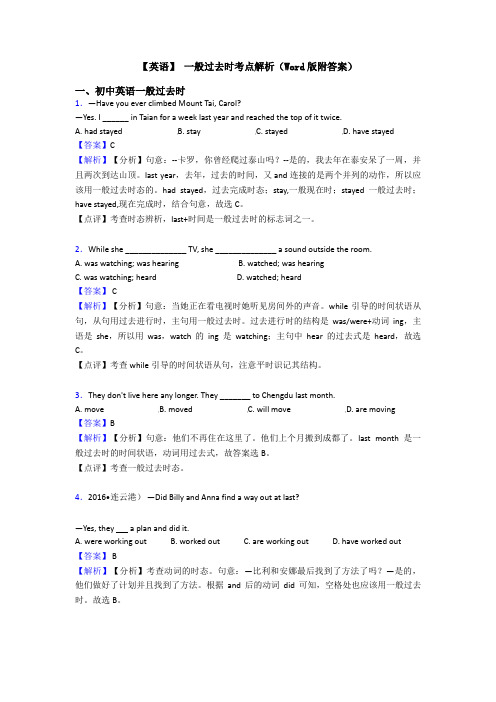
【英语】一般过去时考点解析(Word版附答案)一、初中英语一般过去时1.—Have you ever climbed Mount Tai, Carol?—Yes. I ______ in Taian for a week last year and reached the top of it twice.A. had stayedB. stayC. stayedD. have stayed【答案】C【解析】【分析】句意:--卡罗,你曾经爬过泰山吗?--是的,我去年在泰安呆了一周,并且两次到达山顶。
last year,去年,过去的时间,又and连接的是两个并列的动作,所以应该用一般过去时态的。
had stayed,过去完成时态;stay,一般现在时;stayed一般过去时;have stayed,现在完成时,结合句意,故选C。
【点评】考查时态辨析,last+时间是一般过去时的标志词之一。
2.While she ______________ TV, she ______________ a sound outside the room.A. was watching; was hearingB. watched; was hearingC. was watching; heardD. watched; heard【答案】 C【解析】【分析】句意:当她正在看电视时她听见房间外的声音。
while引导的时间状语从句,从句用过去进行时,主句用一般过去时。
过去进行时的结构是was/were+动词ing,主语是she,所以用was,watch的ing是watching;主句中hear的过去式是heard,故选C。
【点评】考查while引导的时间状语从句,注意平时识记其结构。
3.They don't live here any longer. They _______ to Chengdu last month.A. moveB. movedC. will moveD. are moving【答案】B【解析】【分析】句意:他们不再住在这里了。
一般过去时详解和练习题

初中一般过去时详解一般过去时是初中英语中非常重要的一个时态。
表示过去某个时间发生的动作或存在的状态,有时也表示过去经常或反复发生的动作。
例如: He left home at half past five yesterday.他昨天五点离开家的。
Li Ming always went to work by bike in the past.过去李明总是骑自行车去上班。
I、用法:1. 表示在过去某个时间里发生的动作或存在的状态。
例如:Lin Tao left for Shanghai at 8:00 yesterday morning.林涛昨天早上八点去上海了。
He was ill last night.昨晚他生病了。
2. 表示过去经常或反复发生的动作。
例如:Li Tao always went to school by bus last term.上学期李涛一直乘公共汽车上学。
3. 表示已故的人曾经做过的事情。
例如:Lao She wrote many great works.老舍写过许多脍炙人口的作品。
4. 表示过去所发生的一系列的动作。
例如:The old man came into the room, took off his clothes and went to bed.这位老人走进屋,脱下衣服,然后上床睡觉了。
Mr. Black got up at six o'clock this morning, dressed, had breakfast, and went to work.布莱克先生今天早上六点起床、穿衣服、吃饭,然后去上班了。
II、一般过去时如何识别?每个时态,都会有其独特的标志性词语(主要是时间状语)。
可以称其为“标志词”。
通常来讲,一般过去时常见的标志词有:1. yesterday, the day before yesterday.2. last week / year / month / term…(简称last系列)3. two hours ago, three years ago, a moment ago…(简称ago系列)4. in / on + 过去的年/月/日,如 in 1999, in April, 20055. just now, once upon a time, one day…III、分类:1. 含有be动词的一般过去时:系动词be的过去式有两种形式:was和were。
英语一般过去时解题技巧及经典题型及练习题(含答案)及解析
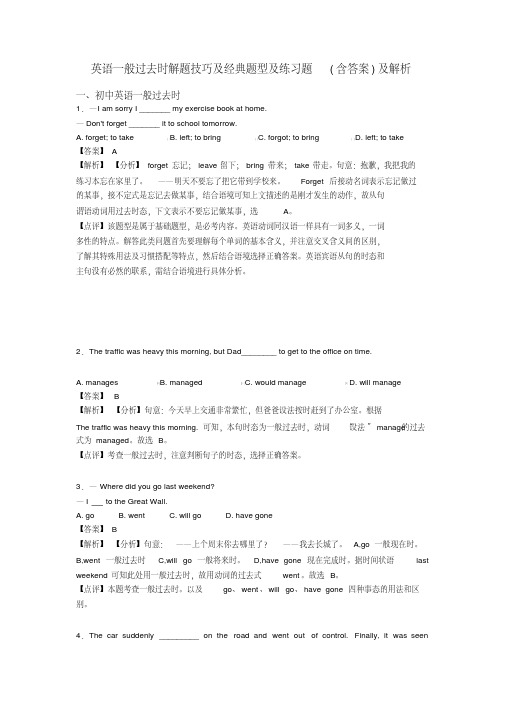
英语一般过去时解题技巧及经典题型及练习题(含答案)及解析一、初中英语一般过去时1.—I am sorry I _______ my exercise book at home.— Don't forget _______ it to school tomorrow.A. forget; to takeB. left; to bringC. forgot; to bringD. left; to take【答案】A【解析】【分析】forget忘记;leave留下;bring带来;take带走。
句意:抱歉,我把我的练习本忘在家里了。
——明天不要忘了把它带到学校来。
Forget后接动名词表示忘记做过的某事,接不定式是忘记去做某事,结合语境可知上文描述的是刚才发生的动作,故从句谓语动词用过去时态,下文表示不要忘记做某事,选A。
【点评】该题型是属于基础题型,是必考内容。
英语动词同汉语一样具有一词多义,一词多性的特点。
解答此类问题首先要理解每个单词的基本含义,并注意交叉含义间的区别,了解其特殊用法及习惯搭配等特点,然后结合语境选择正确答案。
英语宾语从句的时态和主句没有必然的联系,需结合语境进行具体分析。
2.The traffic was heavy this morning, but Dad________ to get to the office on time.A. managesB. managedC. would manageD. will manage【答案】 B【解析】【分析】句意:今天早上交通非常繁忙,但爸爸设法按时赶到了办公室。
根据The traffic was heavy this morning.可知,本句时态为一般过去时,动词“设法”manage的过去式为managed。
故选B。
【点评】考查一般过去时,注意判断句子的时态,选择正确答案。
3.— Where did you go last weekend?— I to the Great Wall.A. goB. wentC. will goD. have gone【答案】B【解析】【分析】句意:——上个周末你去哪里了?——我去长城了。
(英语)英语一般过去时解题技巧及练习题(含答案)及解析
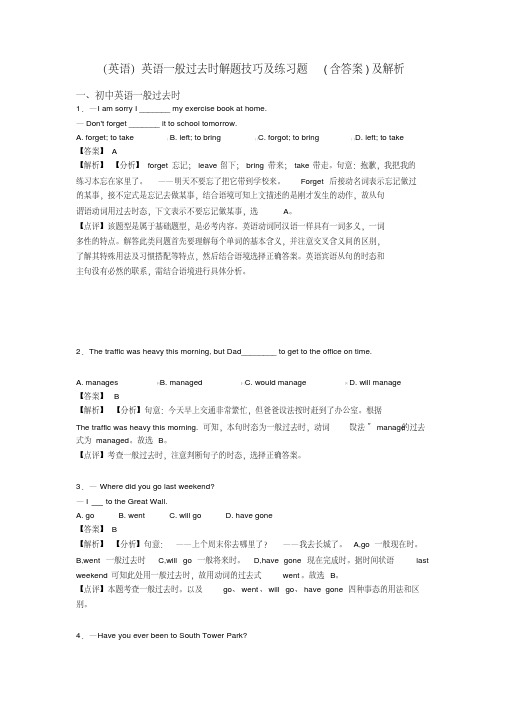
(英语)英语一般过去时解题技巧及练习题(含答案)及解析一、初中英语一般过去时1.—I am sorry I _______ my exercise book at home.— Don't forget _______ it to school tomorrow.A. forget; to takeB. left; to bringC. forgot; to bringD. left; to take【答案】A【解析】【分析】forget忘记;leave留下;bring带来;take带走。
句意:抱歉,我把我的练习本忘在家里了。
——明天不要忘了把它带到学校来。
Forget后接动名词表示忘记做过的某事,接不定式是忘记去做某事,结合语境可知上文描述的是刚才发生的动作,故从句谓语动词用过去时态,下文表示不要忘记做某事,选A。
【点评】该题型是属于基础题型,是必考内容。
英语动词同汉语一样具有一词多义,一词多性的特点。
解答此类问题首先要理解每个单词的基本含义,并注意交叉含义间的区别,了解其特殊用法及习惯搭配等特点,然后结合语境选择正确答案。
英语宾语从句的时态和主句没有必然的联系,需结合语境进行具体分析。
2.The traffic was heavy this morning, but Dad________ to get to the office on time.A. managesB. managedC. would manageD. will manage【答案】 B【解析】【分析】句意:今天早上交通非常繁忙,但爸爸设法按时赶到了办公室。
根据The traffic was heavy this morning.可知,本句时态为一般过去时,动词“设法”manage的过去式为managed。
故选B。
【点评】考查一般过去时,注意判断句子的时态,选择正确答案。
3.— Where did you go last weekend?— I to the Great Wall.A. goB. wentC. will goD. have gone【答案】B【解析】【分析】句意:——上个周末你去哪里了?——我去长城了。
【英语】英语一般过去时常见题型及答题技巧及练习题(含答案)含解析
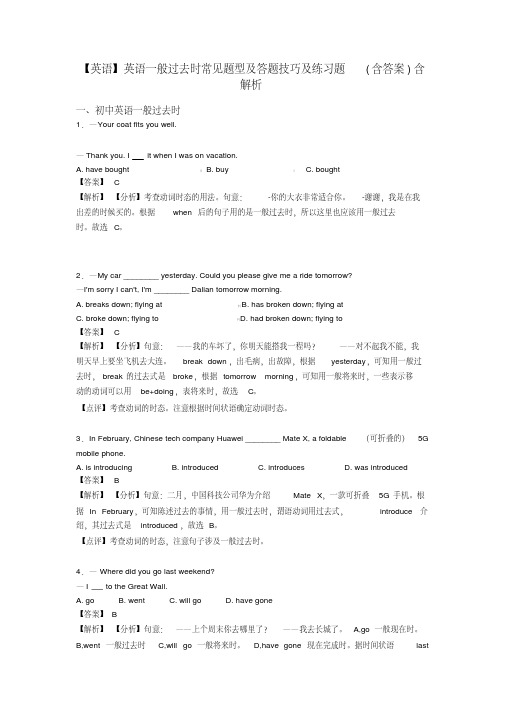
【英语】英语一般过去时常见题型及答题技巧及练习题(含答案)含解析一、初中英语一般过去时1.—Your coat fits you well.— Thank you. I it when I was on vacation.A. have boughtB. buyC. bought【答案】 C【解析】【分析】考查动词时态的用法。
句意:-你的大衣非常适合你。
-谢谢,我是在我出差的时候买的。
根据when后的句子用的是一般过去时,所以这里也应该用一般过去时。
故选C。
2.—My car ________ yesterday. Could you please give me a ride tomorrow?—I'm sorry I can't, I'm ________ Dalian tomorrow morning.A. breaks down; flying atB. has broken down; flying atC. broke down; flying toD. had broken down; flying to【答案】 C【解析】【分析】句意:——我的车坏了,你明天能搭我一程吗?——对不起我不能,我明天早上要坐飞机去大连。
break down,出毛病,出故障,根据yesterday,可知用一般过去时,break的过去式是broke,根据tomorrow morning,可知用一般将来时,一些表示移动的动词可以用be+doing,表将来时,故选C。
【点评】考查动词的时态。
注意根据时间状语确定动词时态。
3.In February, Chinese tech company Huawei ________ Mate X, a foldable (可折叠的) 5G mobile phone.A. is introducingB. introducedC. introducesD. was introduced【答案】 B【解析】【分析】句意:二月,中国科技公司华为介绍Mate X,一款可折叠5G手机。
初中英语一般过去时讲解+练习(含答案)
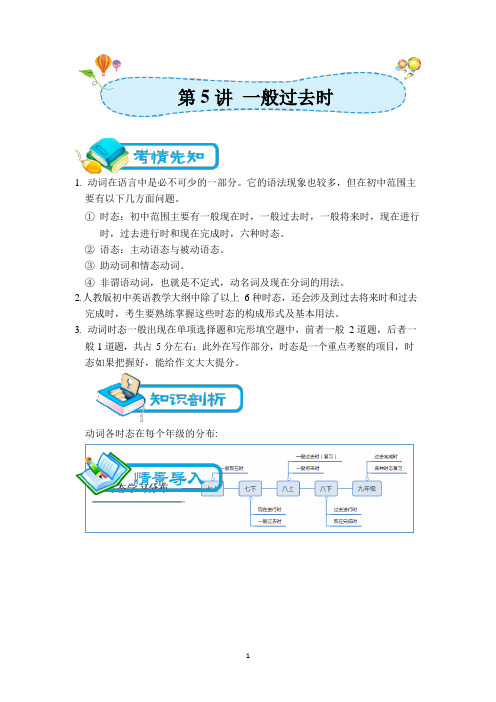
1. 动词在语言中是必不可少的一部分。
它的语法现象也较多,但在初中范围主要有以下几方面问题。
① 时态:初中范围主要有一般现在时,一般过去时,一般将来时,现在进行时,过去进行时和现在完成时,六种时态。
② 语态:主动语态与被动语态。
③ 助动词和情态动词。
④ 非谓语动词,也就是不定式,动名词及现在分词的用法。
2. 人教版初中英语教学大纲中除了以上 6 种时态,还会涉及到过去将来时和过去完成时,考生要熟练掌握这些时态的构成形式及基本用法。
3. 动词时态一般出现在单项选择题和完形填空题中,前者一般 2 道题,后者一般 1 道题,共占 5 分左右;此外在写作部分,时态是一个重点考察的项目,时态如果把握好,能给作文大大提分。
动词各时态在每个年级的分布:第 5 讲 一般过去时1.yesterday 或与其构成的短语:yesterday morning(afternoon, evening)等;2.由 last+时间名词构成的短语:last night, last year (winter, month, week)等;3.由―时间段+ago 构成的短语:a moment ago, a short time ago, an hour ago 等;4.其它 just now ,过去的时间:in 2000 等;一般过去时在七年级下册 Unit 11 中第一次出现,在这个单元的学习中,学生需要掌握以下知识点:一般过去时的定义及特征一般过去时的两种结构及其变化一般过去时的规则动词变形和不规则变形一般过去时的定义及特征定义:表示过去某个时间里发生的非持续性动作或存在的状态,也表示过去经常或反复发生的动作。
She opened the door this morning. (过去的非持续性动作) They were expensive twenty years ago. (过去存在的状态) I went swimming every Saturday last year. (过去经常发生的事)特征: a.谓语动词用过去式She was a doctor.I watered the flowers in the back yard. b.有表示过去的时间词She saw some paintings yesterday . Mary went fishing last weekend .注意:常与过去时搭配使用的标志性时间词1. 否定: 主语+was/were + not +其它 I was not (wasn’t) here yesterday.My parents were not (weren’t) at home last 2. 一般疑问句: Was/ Were +主语+其他?肯定回答用―Yes, 主语+was/were. 否定回答用―No, 主语+wasn’t/weren’t. ―Were you at home yesterday? ―Yes, I was. (No, I wasn’t.)—Were Wei Hua and Han Mei here just3. 特殊疑问句:特殊疑问词 + was/ were + 主语+其他?【即学即练】1. He usually gets up early in the morning. But he late today.2. She usually works from 8 a.m. to 5 p.m. But she from 8 a.m. to 6 p.m. yesterday.3. They often go to the park on Sundays. But they to the park last Monday.4. He reads the newspaper at breakfast. But he the newspaper yesterday morning.一般过去时的两种结构及其变化结构一:表示过去的状态: 主语+was/were +其它如:She was here yesterday.Three years ago I was a pupil. My parents were at home last night. 变化形式:否定:主语+did not +实义动词原形+其它 He didn’t watch TV yesterdayMike did not go to the farm last Sunday.一般疑问句: Did+ 主语+实义动词原形+其它? Did he watch TV yesterday?Did Mike go to the farm last Sunday?3.特殊疑问句:特殊疑问词 + did+ 主语 +实义动词原形+其它?What did he do yesterday?Where did Mike go last Sunday?结构二:表示过去发生的动作: 主语+实义动词过去式+其它注意:实义动词过去式分为规则和不规则变化(知识点三、四将会做详细讲解)如:He watched TV yesterday.Mike went to the farm last Sunday. Tom came to China last month. 变化形式:【即学即练】 1. My father ill yesterday. ( 2017 长沙七年级期末) A. isn’t B. aren’t C. wasn’tD. weren’t 2. your parents at home last week? ( 2017 江西七年级月考)A. isB. wasC. areD. were3. The twins in Dalian last year. They here now. ( 2016 大连七年级期末) A. are; wereB. were; areC. was; areD. were; was4. I my homework at 7:00 yesterday evening. ( 2017 兰州七年级期末)A. finishedB. would finishC. was finishingD. finish5. —?— He did some reading at home. ( 2017 安徽中考) A. What does your father do yesterday evening? B. What does your brother do in the school? C. What did your brother do over the weekend? D. Where did your brother go last Sunday?一般过去时的规则动词规则变形及不规则变形规则变形:情况加法原形例词一般情况加-ed look looked 以e 收尾的词加-d use used末尾只有一个辅音字母的重读闭音节词先双写这个辅音字母,再加-edstopplanstoppedplanned以“辅音字母+y”结尾的动词先变y 为i,再加-ed worrystudyworriedstudied不规则变形:1.中间去e 末尾加t,如:keep →kept,feel →felt,sleep →slept,sweep →swept2.结尾d 变t,如:build →built,lend →lent,send →sent,spend →spent3.遇见i 改为a,如:ring →rang,sit →sat,drink →drank,sing →sang,swim→ swam,4.“骑(马)”“开(车)”“写(字)”把i 变o 如:ride →rode,drive →drove,write →wrote 5.“想”“买”“带来”“打仗”ought 换上,如:think →thought,buy →bought,bring →brought,fight →fought6.“教书”“抓住”——aught 切莫忘,如:teach →taught,carry →caught7.ow/aw 改为ew 是新时尚,如:know →knew,grow →grew,throw →threw,draw →drew 8.“放”“让”“读”过去式与原形一个样,如:put → put,let → let,read → read /red/【即学即练】Dear Jim,My school trip 1. (is) great! We 2. (have) so much fun! We 3.(go) to Green Park. We 4. (climb) the mountains there and 5.(see) a lot of flowers. We 6. (eat) lunch under some trees and 7.(play) some games after that. But at about two o’clock, it 8. (get) very cloudy and we 9. _ (worry) it would rain. Luckily, it 10. (do not),and the sun 11. (come) out again!Bill易错点一:难以判别是否用过去式,如:I went to the supermarket and bought (buy) some fruit.由于没有找到时间状语,因而不知道应该填什么。
一般过去时详解和练习题

初中一般过去时详解一般过去时是初中英语中非常重要的一个时态。
表示过去某个时间发生的动作或存在的状态,有时也表示过去经常或反复发生的动作。
例如:He left home at half past five yesterday.他昨天五点离开家的。
Li Ming always went to work by bike in the past.过去李明总是骑自行车去上班。
I、用法:1. 表示在过去某个时间里发生的动作或存在的状态。
例如:Lin Tao left for Shanghai at 8:00 yesterday morning.林涛昨天早上八点去上海了。
He was ill last night.昨晚他生病了。
2. 表示过去经常或反复发生的动作。
例如:Li Tao always went to school by bus last term.上学期李涛一直乘公共汽车上学。
3. 表示已故的人曾经做过的事情。
例如:Lao She wrote many great works.老舍写过许多脍炙人口的作品。
4. 表示过去所发生的一系列的动作。
例如:The old man came into the room, took off his clothes and went to bed.这位老人走进屋,脱下衣服,然后上床睡觉了。
Mr. Black got up at six o'clock this morning, dressed, had breakfast, and went to work.布莱克先生今天早上六点起床、穿衣服、吃饭,然后去上班了。
II、一般过去时如何识别?每个时态,都会有其独特的标志性词语(主要是时间状语)。
可以称其为“标志词”。
通常来讲,一般过去时常见的标志词有:1. yesterday, the day before yesterday.2. last week / year / month / term…(简称last系列)3. two hours ago, three years ago, a moment ago…(简称ago系列)4. in / on + 过去的年/月/日,如in 1999, in April, 20055. just now, once upon a time, one day…III、分类:1. 含有be动词的一般过去时:系动词be的过去式有两种形式:was和were。
英语一般过去时解题技巧分析及练习题(含答案)含解析
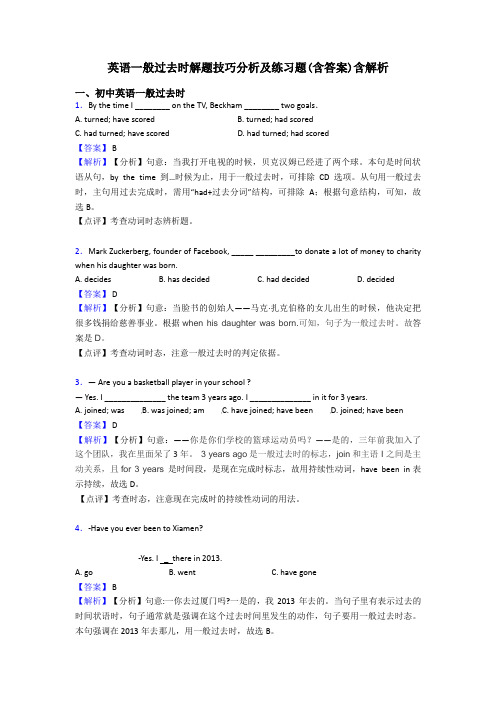
英语一般过去时解题技巧分析及练习题(含答案)含解析一、初中英语一般过去时1.By the time I ________ on the TV, Beckham ________ two goals.A. turned; have scoredB. turned; had scoredC. had turned; have scoredD. had turned; had scored【答案】 B【解析】【分析】句意:当我打开电视的时候,贝克汉姆已经进了两个球。
本句是时间状语从句,by the time到…时候为止,用于一般过去时,可排除CD选项。
从句用一般过去时,主句用过去完成时,需用“had+过去分词”结构,可排除A;根据句意结构,可知,故选B。
【点评】考查动词时态辨析题。
2.Mark Zuckerberg, founder of Facebook, _____ _________to donate a lot of money to charity when his daughter was born.A. decidesB. has decidedC. had decidedD. decided【答案】 D【解析】【分析】句意:当脸书的创始人——马克·扎克伯格的女儿出生的时候,他决定把很多钱捐给慈善事业。
根据when his daughter was born.可知,句子为一般过去时。
故答案是D。
【点评】考查动词时态,注意一般过去时的判定依据。
3.— Are you a basketball player in your school ?— Yes. I ______________ the team 3 years ago. I ______________ in it for 3 years.A. joined; wasB. was joined; amC. have joined; have beenD. joined; have been【答案】 D【解析】【分析】句意:——你是你们学校的篮球运动员吗?——是的,三年前我加入了这个团队,我在里面呆了3年。
(英语)英语一般过去时解题技巧讲解及练习题(含答案)及解析

(英语)英语一般过去时解题技巧讲解及练习题(含答案)及解析一、初中英语一般过去时1.-Have you finished your homework?-Yes, I have. I it this morning.A. finishB. finishesC. finishedD. have finished【答案】C【解析】【分析】句意:你完成你的作业了吗?——是的,我完成了。
我今天早晨完成的。
结合语境可知下文描述的是过去某时发生的动作,故用一般过去时态。
选C。
【点评】英语中的时态主要是借助于时间状语与上下文语境来进行判断。
解答此类题型,首先要注意句子中的时间状语,如果没有则要通过分析上下文,结合语境来判断句子的时态。
英语疑问句中一般具有时态上的对应关系,注意结合这一特点进行区分。
2.I was walking in the street when someone _______ me.A. calledB. was callingC. callsD. call【答案】 A【解析】【分析】句意:我正在街上走这时有人叫我。
状语从句中前后时态要保持一致,根据主句中的was walking可知此处用过去的时态,排除CD;此处call表示短暂性动作,所以不用进行时态,故答案为A。
【点评】考查动词的时态,注意时态的前后一致。
3.—Do you know who invented lights?—Yes, they by Edison.A. inventedB. are inventedC. were inventedD. was invented 【答案】 C【解析】【分析】句意:——你知道谁发明了电灯吗?——是的,它们是被爱迪生发明的。
A. invented发明,一般过去时态; B. are invented被邀请;一般现在时态的被动语态;C. were invented被邀请,一般过去时态的被动语态; D. was invented被邀请,一般过去时态的被动语态,单数。
人教版英语英语一般过去时形式讲解及解析

人教版英语英语一般过去时形式讲解及解析一、初中英语一般过去时1.—When _______ you _______ your homework?—I had finished it before he _______ back.A. have; finished; cameB. have; finished; was comingC. did; finish; cameD. did; finish; was coming【答案】 C【解析】【分析】考查时态。
根据语境知,询问的是完成作业的时间,故用一般过去时。
句意:——你什么时候完成的作业?——在他回来之前我就完成了。
故选C。
2. __ terrible environment! The pollution here is even more serious than I __ .A. What a; thoughtB. How; thinkC. What an; thinkD. How; thought【答案】 A【解析】【分析】句意:多么糟糕的环境啊!这里的污染比我想的更严重。
What 和How 都可以引导感叹句,其句型是what +a/an+形容词+可数名词单数或者what +形容词+可数名词复数或不可数名词;how +形容词+a/an+可数名词单数或how +形容词或副词。
第一个空修饰的是名词environment,是可数名词单数,故用what;根据句意可知,我所想的应是过去所想,现在已经看到了这里的环境,故第二个空应用一般过去时态。
选A。
3.A bridge ________over the river last year.A. buildsB. builtC. was builtD. is built【答案】 C【解析】【分析】句意:去年河上建了一座桥。
主语是谓语的执行者时,用主动语态,主语是谓语的承受者时,用被动语态。
a bridge是谓语build的承受者,用被动语态;表示在last year发生的过去动作,用一般过去时态,故选C。
- 1、下载文档前请自行甄别文档内容的完整性,平台不提供额外的编辑、内容补充、找答案等附加服务。
- 2、"仅部分预览"的文档,不可在线预览部分如存在完整性等问题,可反馈申请退款(可完整预览的文档不适用该条件!)。
- 3、如文档侵犯您的权益,请联系客服反馈,我们会尽快为您处理(人工客服工作时间:9:00-18:30)。
一般过去时讲解及练习一、一般过去时的概念和用法一般过去时表示过去某个时间发生的动作或存在的状态,常和表示过去的时间状语连用。
一般过去时也表示过去经常或反复发生的动作。
Eg:-What did you do yesterday?-I met Lin Tao . (过去某个时间发生的动作)I was there a moment ago. (过去某个时间存在的状态)We often played together when we were children.(过去经常或反复发生的动作)注:表示过去经常发生的动作还可用used to 。
Eg:He used to smoke a lot, but he doesn’t now.他过去经常抽烟,但现在不抽了。
二、常用于一般过去时的时间状语yesterday, this morning,just, just now, ...ago(a moment ago,3 days ago,2 hours ago...), in the past,last night / year / week, once upon a time, the other day,以及时间状语从句中(常用引导词:before,after,when,until, as soon as 等)。
Eg:It was raining heavily when I left school.Mr. Green didn’t start cooking until his son was back from school last night.三、一般过去时对谓语动词的要求一般过去时用动词的过去式构成。
即一般过去时的谓语动词要用动词的过去式。
动词过去式的构成分规则变化和不规则变化两种形式,不规则变化通常需要逐个记忆,规则变化则遵循以下原则:(1)一般在动词后加-ed。
如:play—played(玩,打), offer—offered(提供), weigh—weighed(重), destroy— destroyed(毁坏), sign—signed(签名).(2)在以字母e结尾的动词后,只加-d。
如:like—liked(喜欢), provide—provided(提供),hate — hated(讨厌), date—dated(确定…年代)。
(3)在以“辅音字母+y”结尾的动词后,则改y为i,再加—ed。
如:supply—supplied(提供), fly—flied(飞), study— studied(学习). (4)在以单短元音的重读闭音节结尾且,末尾只有一个辅音字母的动词后,双写最后一个辅音字母,再加-ed。
如:plan—planned(计划), refer—referred(涉及),regret—regretted(后悔), ban—banned(惩罚).ps: offer侧重表示“愿意给予”,常用于offer sb. sth.或offer to do sth. 结构。
provide指有远见,为应付意外、紧急情况等作好充分准备而“供给、提供”,可用于provide sb.(with sth.)或provide sth.(for sb.)结构。
supply通常指定期“供应”,强调替代或补充所需物品,常用于supply sb. with sth.或supply sth. to sb.结构。
四、部分不规则动词过去式归纳五、一般过去时的否定句和疑问句1.带有was或were的句子否定句在be动词:was或were后加not。
Eg1:I was ten years old then.否定句:I wasn’t ten years old then.Eg2: Tom and his family were in America two years ago.否定句:Tom and his family weren't in America two years ago.一般疑问句:参照陈述句变一般疑问句的规则:一提二改三照抄;①把was或were提前,其他照写。
②I→you; we→you; my→your; was→were。
③剩下的内容照抄下来,加问号。
Eg1:一般疑问句:Were you ten years then?肯定回答;Yes,I was. 否定回答;No, I wasn’t.Eg2:一般疑问句:Were Tom and his family in America two years ago? 肯定回答:Yes, they were. 否定回答:No,they weren’t.特殊疑问句:针对不同部位提问,用不同的疑问词。
Eg1: -How old were you then?回答:I was ten years old then.\ -Ten.Eg2:Where were Tom and his family two years ago?回答:They were in America.2.谓语动词为实义动词的句子变否定句时在动词前加didn't,句子中的动词过去式变回原形。
变一般疑问句时在句首加Did,句子中的动词过去式变回原形。
Eg:Jim went home yesterday.否定句:Jim didn't go home yesterday.一般疑问句:Did Jim go home yesterday?肯定回答:Yes, he did. 否定回答: No, he didn’t.特殊疑问句:特殊疑问词+一般疑问句What did Jim do yesterday?随堂练习:一、单项选择:从下列各题后所给的四个选项中选择最佳答案填空。
( ) 1. Lee ________ his mobile phone at home.A. leaveB. leavesC. leavedD. left( ) 2. _____ he ________ a good rest? No, he didn’t.A. Do, hadB. Did, haveC. Did, hadD. Was, had ( ) 3. As soon as he ________, he ______ to his family.A. arrived, writesB. arrived, writtenC. arrived, wroteD. arriveds, write( ) 4. Mr. Black was late because he _______ his way.A. lostedB. loseC. losesD. lost( ) 5. When _________ Lee ________ school this morning?A. did, got toB. did, get toC. did, getD. did, got( ) 6. Will you please say it again? I ________ quite _______ you.A. didn’t, hearB. don’t, heardC. didn’t, heardD. don’t, hear( ) 7. ______ you ________ at six o’clock yesterday?A. Do ,get upB. Did, get upC. Do, got upD. Did, got up ( ) 8.What did you see _________?A. nowB. every dayC. these daysD. just now( ) 9.He went into the room and _______ the door.A. lockB. lockingC. locksD. locked( ) 10. —What _____ you _______ last week? —I bought a bag.A. did ,buyB. did , boughtC. do, buyD. do, bought( ) 11. —_____ he ____ his lunch? — Yes, he did.A. Does ,hasB. Does, haveC. Did, haveD. Did, had( ) 12. -When did May come back from Jinan?-She from Jinan last Friday.A. come backB. comes backC. returned backD. came back ( ) 13. ____ she _____ this dictionary in the bookshop nearby last week?A. Did, buyB. Does, buyC. Did, boughtD. Does, buys( ) 14. Where _____ Uncle Sun yesterday?A. wasB. wereC. didD. does( ) 15. There _____ a telephone call for my brother Steven yesterday.A. isB. areC. wasD. were( ) 16. Liu Fengwei _____ three yuan for the lost library book.A. paidB. payC. spentD. lost( ) 17. He ____ in this school in 1958.A. taughtB. teachC. teachesD. teaching( ) 18. They _____ tired so they stopped ____ a rest.A. are, haveB. were, haveC. were, to haveD. are, having ( ) 19. She said her brother ____ in Beijing. He ______ to Japan onbusiness last week.A. wasn’t, wentB. hasn’t, wentC. wa sn’t, goD. isn’t, went( ) 20.My father ill yesterday.A.isn't B.aren't C.wasn't D.weren't( ) 21. your parents at home last week﹖A.Is B.Was C.Are D.Were( ) 22.The twins in Dalian last year.They here now.A.are; were B.were; are C.was; are D.were; was ( ) 23.your father at work the day before yesterday (前天)?A.Was B.Is C.Were D.Is( ) 24.—Who was on duty last Friday? —.A.I am B.I was C.Yes, I was D.No, I wasn't 答案:DBCDB ABDDA CDAAC AACAC DBAB二、请用所给动词的正确形式填空。
